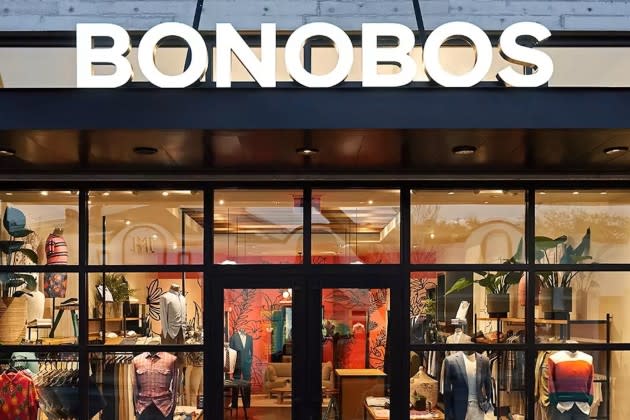WHP and Express Buying Bonobos From Walmart for $75M

Bonobos has found a new home after nearly six years under the Walmart Inc. umbrella.
Brand management firm WHP Global and Express Inc. agreed to buy the direct-to-consumer men’s pioneer for a combined $75 million — a steep discount to the $310 million Walmart shelled out for the brand in 2017.
More from WWD
WHP is paying $50 million for the brand while Expr, the company that runs Express, will pick up the operating assets and liabilities for $25 million.
The deal was signed on Thursday is expected to close in the second quarter, when Expr and WHP plan to enter into an exclusive long-term license agreement that will have Expr running the business in the U.S.
This is the first joint acquisition by the two companies, which formed a strategic partnership in January when WHP bought a 60 percent stake in the Express brand.
Yehuda Shmidman, WHP’s global chairman and chief executive officer, said Bonobos was the right brand for the two companies to start with.
“It’s just a perfect fit,” Shmidman told WWD in a joint interview with Expr CEO Tim Baxter. “It’s a brand that has had consistent growth that also has future opportunities for growth.”
While Expr builds on the business in the U.S., WHP will look to find overseas partners to give the brand more of a global presence and could also help bring in some new product categories under license.
“We see all upside,” said Shmidman, adding that the brand has a very loyal following and plenty of room to grow.
WHP already owns Anne Klein, Joseph Abboud, Joe’s Jeans, Isaac Mizrahi, William Rast and others, which together with Bonobos, will generate nearly $7 billion in annual retail sales.
And the brand management firm plans to keep at it, with help from a $375 million investment from investment giant Ares Management last month.
“We still have quite a lot of fuel ready to be deployed for more brand acquisitions,” Shmidman said. “We’re looking to acquire at least one more brand this year after Bonobos. We’re not going to buy 100, even though there are so many opportunities out there.”
In the meantime, Expr’s Baxter will be looking to build Bonobos in the U.S., where he said would be accretive to operating earnings and free cash flow positive this year.
While Bonobos was a standout among a wave of digital natives that took fashion by storm a decade ago, the business took on a lower profile at Walmart.
Baxter said Expr could bring the brand “an intense focus and experience in speciality retail.”
“We are a 43-year-old omnichannel retailer and we know we can bring a tremendous amount to the table,” said Baxter, pointing to the company’s four strategic pillars of product, brand, customer and execution.
While Expr will be looking to realize synergies and drive efficiencies on the back end of the business, Baxter said the Bonobos would otherwise be operated completely independently.
Bonobos CEO John Hutchison will continue to lead the business as brand president and will report to Baxter.
The CEO also said Bonobos’ distinctive guide shops would hold to their strategy and operate as showrooms where customers can try on and buy looks while getting them delivered later.
There will be other changes, though, including the Bonobos Fielder line, which was sold in Walmart stores and is expected to be discontinued.
When the deal closes it will mark a third chapter for Bonobos after its go-go independent days when Andy Dunn hailed it as a part of a new wave and after being owned by Walmart.
The discount retail giant said: “Bonobos joined the Walmart family to expand our assortment and expertise in menswear. Since acquiring Bonobos, Walmart.com has grown from 70 million to hundreds of millions of items. After nearly six years, we’ve decided it’s the right time to sell Bonobos.”
The deal also marks a kind of turning of the page for Walmart, which snatched up Bonobos along with a number of other d-to-c brands as it squared off online with Amazon.
But those businesses have steadily transitioned out at Walmart.
ModCloth was sold off in 2019 and the retailer cut a deal to offload Moosejaw to Dick’s Sporting Goods this year. Similarly, the once-buzzy Jet.com business was acquired in 2016 and absorbed into the flagship in 2019.
Those businesses might have come and gone, but they did help inject new life into Walmart, which has successfully pivoted to become what it describes as a “people-led, technology-powered omnichannel retailer.”
Since the Jet deal was announced, Walmart’s market capitalization has grown by more than $170 billion to about $402 billion.
Best of WWD
